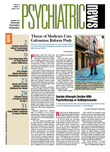Olanzapine, quetiapine, and risperidone produced modest improvements in neurocognition in patients in the early stages of psychosis, according to results from a 52-week, double-blind, multicenter study.
In the study, 400 patients with early-stage psychosis (defined as the first five years of disease) were randomly assigned to treatment with olanzapine (2.5-20 mg/day), quetiapine (100-800 mg/day), or risperidone (0.5-4 mg/day). The results of the study appear in the July American Journal of Psychiatry.
The study was part of the “Comparison of Atypicals in First Episode of Psychosis” research program coordinated by the University of North Carolina. Funding for the program was provided by AstraZeneca, which manufactures quetiapine.
Of the 400 patients in the study, 224 completed neurocognitive assessments at baseline and at 12 weeks, and 81 patients also completed them at 52 weeks. Neurocognitive composite scores were calculated from the neurocognitive battery used in the Clinical Antipsychotic Trials of Intervention Effectiveness (CATIE) study and the Brief Assessment of Cognition in Schizophrenia.
At week 12, there was modest but statistically significant improvement in neurocognition for each treatment, but no significant overall difference between treatments. Statistically significant relationships between improvement in neurocognition and functional outcome were observed at weeks 12 and 52.
The lead author of the report was Richard Keefe, Ph.D., a professor of psychiatry and behavioral sciences at Duke University Medical Center. Other psychiatry departments participating in the study were those at the University of Illinois at Chicago, University of North Carolina, and Columbia University.
“This result is the first direct evidence that antipsychotic treatment-related cognitive changes in patients with early psychosis may be clinically relevant for occupational and social functioning,” the authors said. “However, interpretation of this relationship is tempered by analyses indicating that symptom change and baseline cognitive scores also predicted the variance in functional outcomes. Thus, cognitive improvement may be a part of a general treatment response that is associated with improved functional outcomes.”
However, William Carpenter, M.D., who has been critical of many pharmaceutical-funded studies of second-generation antipsychotics—especially claims of cognitive efficacy—downplayed the significance of the results, saying the improvements in cognition were small and may be attributable to other causes.
He emphasized that the study included no control group and had a high attrition rate (only 81 of the original 400 patients completed the 52-week study). “If we don't know effect in the poor-outcome patients, we cannot estimate the overall effect,” he said.
“Patients throughout medicine tend to get better after entering a clinical trial,” Carpenter said. “If the slight improvement was real, it could be that these phenomena do not require a drug-effect explanation. The tests are vulnerable to a practice effect, and the small improvements may have been simply what happens the second and third times you take the tests.”
He added, moreover, that patients in the study had been previously treated.“ If they were on a drug that interferes with cognition at baseline, any improvement may simply be getting over an adverse effect,” Carpenter told Psychiatric News.
A companion study in the same edition of the journal reporting results from the same cohort showed that effectiveness in early-psychosis patients, as measured by rates of all-cause treatment discontinuation, were similar for the three atypical antipsychotics.
In that study, all-cause treatment discontinuation rates at 52 weeks were 68.4 percent (olanzapine), 70.9 percent (quetiapine), and 71.4 (risperidone).
Reductions in total score on the Positive and Negative Syndrome Scale (PANSS) were similar for the three treatment groups, but reductions in PANSS positive subscale scores were greatest in the olanzapine group (at 12 weeks and at 52 weeks or withdrawal from study) and the risperidone group (at 12 weeks).
“These results suggest that quetiapine, although comparably effective in the treatment of patients early in the course of schizophrenia, schizoaffective disorder, or schizophreniform disorder as assessed on global measures, may be somewhat less potent than olanzapine and risperidone at the doses administered in this study,” the investigators said in the report.
